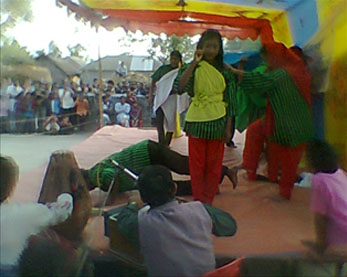
While these self-help groups have helped people make huge advances in terms of literacy, leadership development and income generation, they are not always having the desired impact on people’s health. This is especially true when it comes to women’s health issues around pregnancy and delivery.
In most of rural Bangladesh, women deliver their babies at home and have little interaction with community health centers. They are assisted by traditional birth attendants, but these attendants are not always trained to deal with complicated deliveries and medical emergencies. While women could travel to medical centers for emergency assistance, means of transportation are not always available or affordable. As a result, the rates of infant and maternal death during labor and delivery are high.
Through support from the Canadian government’s Department of Foreign Affairs, Trade and Development (DFATD), World Renew has been working with SUPOTH, one of its local partners, to address these problems. This includes training birth attendants on maternal and newborn care, but it also includes encouraging communities to set up emergency health funds to transport pregnant women to health centers when emergencies arise.
In Tepakhoribari union there are two self-help groups called Mehdi and Bonolota. These group members were reluctant to start collecting additional money from their group members for an Emergency Health Fund. While other self-help groups tried to explain the importance of an Emergency Health Fund to the Mehdi and Bonolota groups, the group members simply didn’t see the need for it.
Then, a local Theater for Development team from SUPOTH came to Tepakhoribari. They performed a skit about local maternal and child care issues that included the heart-wrenching story of a mother who died because she did not have the funds needed to pay for transportation to a medical center.
“The show displayed the consequences of mother death in such a way that many women burst into tears and even some men wiped their eyes during the show,” said one SUPOTH staff member. “The drama team then motivated people to talk more about the issue.”
A few days later, the members of the Mehdi and Bonolota groups held their monthly meetings and discussed what they had learned at the show. They all agreed that the show had had an impact on them.
“We didn’t understand and realize about the importance of Emergency Health Funds, but the drama team made us understand the real need for them,” said one female group member.
They decided to start saving for an Emergency Health Fund. Group members now contribute a small amount towards this fund at each of their monthly meetings. They hope to soon have enough that they can begin helping those with needs.
The DFATD supported Maternal and Child Health program in Bangladesh is in its third year and will end in April 2015. The goal is to train 53 community health volunteers, traditional birth attendants and informal health providers on maternal and newborn care and to help communities set up Emergency Health Funds. By the end of the project, the project aims to reach 42,485 people. As of March 2014, it has already reached 37,485.
While the DFATD supported program will end in April 2015, World Renew and SUPOTH will continue their work in maternal and child health after this project is over.
Photo top: A women’s self-help group meeting in rural Bangladesh. Photo credit: Kristen deRoo Vanderberg
